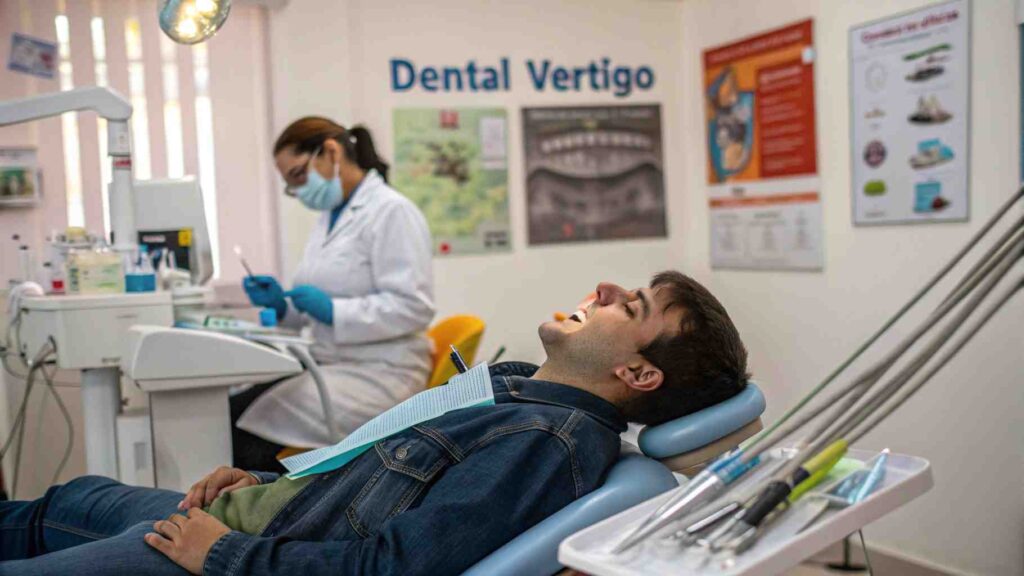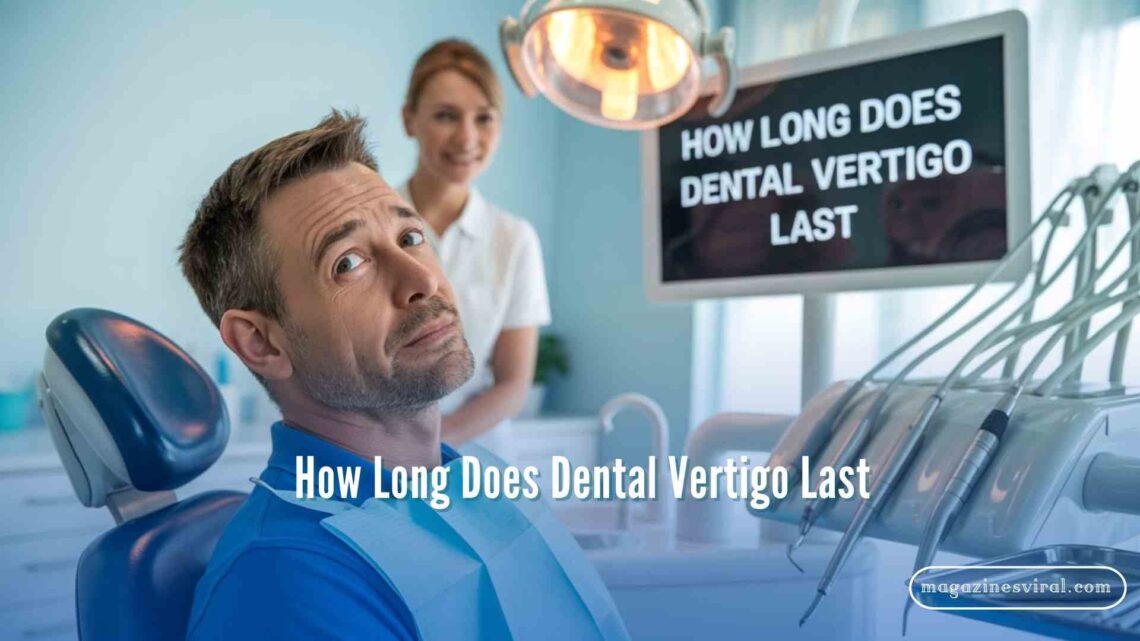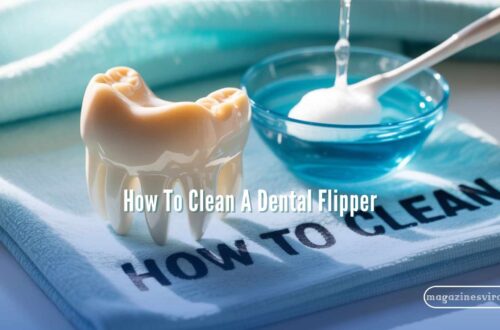Dental vertigo usually lasts a few hours to 2 days depending on the cause. If it lasts longer consult a doctor to rule out other issues.
Stay tuned with us as we dive into everything you need to know about how long dental vertigo lasts. Whether it’s mild or lingering, we’re here to help you understand and manage it better!
What Is Dental Vertigo?
Dental vertigo refers to dizziness or a spinning sensation following a dental procedure. While it might feel like it originates in the mouth or jaw, vertigo is often tied to the inner ear, which helps control balance. Given the proximity of the teeth, jaw, sinuses and inner ear it is not surprising that dental work can sometimes affect equilibrium.
Vertigo differs from general lightheadedness—it involves the perception that you or your surroundings are moving when they’re not.
Common Characteristics of Dental Vertigo:
- Sensation of spinning or swaying
- Nausea or queasiness
- Balance issues or unsteady walking
- Ringing in the ears (tinnitus)
- Headache or pressure in the temples
How Long Does Dental Vertigo Typically Last?
The duration of dental vertigo varies by cause and individual health status. Here is a breakdown of average timelines based on common sources:
| Cause | Typical Duration |
| BPPV (inner ear crystals) | Seconds to a few days |
| TMJ dysfunction | Days to weeks (chronic if untreated) |
| Anesthetic side effects | 1 to 24 hours |
| Sinus-related dizziness | 3 to 10 days (longer with infection) |
| Anxiety-induced vertigo | A few minutes to several hours |
| Cervical (neck-related) dizziness | Hours to several days |
Most patients recover within 24 to 48 hours especially if the dizziness is positional or caused by anesthesia. However, if symptoms extend beyond 3 days or worsen further evaluation is advised.
Root Causes of Dental Vertigo

Let’s dive deeper into why dental procedures can cause vertigo or dizziness.
Benign Paroxysmal Positional Vertigo (BPPV)
BPPV is one of the most common causes of sudden vertigo. It occurs when calcium carbonate crystals (otoconia) inside the inner ear become dislodged and disrupt balance signals.
During dental treatment, reclining the head sharply backward or turning the head to one side for long periods can inadvertently trigger BPPV—especially in older adults.
- Symptoms: Spinning sensation triggered by head movement, often lasting under a minute.
- Treatment: Canalith repositioning maneuvers (Epley maneuver), physical therapy, balance exercises.
Temporomandibular Joint (TMJ) Dysfunction
The TMJ joint connects your jawbone to your skull located just in front of each ear. It is intimately linked with the inner ear meaning any dysfunction—whether due to jaw misalignment, stress-related grinding, or prolonged mouth opening—can result in dizziness or vertigo.
- Symptoms: Jaw clicking, facial pain, ear fullness, dizziness that comes and goes.
- Duration: Chronic or recurrent unless treated.
- Treatment: Bite splints, physical therapy anti-inflammatory medications, and sometimes dental realignment.
Reaction to Local Anesthesia
Local anesthetics used during dental procedures, especially those containing epinephrine, can cause temporary side effects like dizziness, increased heart rate, or lightheadedness. This is usually short-lived.
Duration: 1 to 3 hours; up to 24 hours in rare cases.
Tip: Notify your dentist if you’ve experienced dizziness from anesthesia before—they can adjust the dosage or use an alternative formula.
Sinus Proximity and Inflammation
Upper molars are very close to the maxillary sinuses. Procedures involving these teeth (like extractions, root canals or implants) may irritate the sinuses causing congestion or infection which in turn affects balance.
- Symptoms: Facial pressure, post-nasal drip, dizziness or vertigo with head movement.
- Duration: 3 to 10 days (longer with sinusitis or infection).
- Treatment: Decongestants, saline rinses antibiotics (if infected), rest.
Anxiety and Hyperventilation
It is not uncommon for people to feel anxious at the dentist. In some cases anxiety can lead to hyperventilation, resulting in dizziness, tingling or numbness.
- Symptoms: Shakiness, shortness of breath, dizziness, sweating.
- Duration: A few minutes to a few hours resolves once calm returns.
- Treatment: Deep breathing exercises anti-anxiety techniques or mild sedatives.
Cervicogenic (Neck-Related) Vertigo
Prolonged strain on the neck or cervical spine during dental procedures can affect vertebral arteries or nerve signals, potentially causing balance disturbances.
- Symptoms: Neck stiffness, headache, vertigo that worsens with neck movement.
- Duration: Hours to several days.
- Treatment: Massage therapy, chiropractic adjustments, posture correction.
Extended Symptoms and Red Flags to Watch For:
While dental vertigo is usually short-lived, there are warning signs that indicate it could be more serious.
Seek Immediate Medical Attention If:
- Dizziness lasts longer than 72 hours
- Vertigo is accompanied by nausea, vomiting or double vision
- You experience hearing loss, tinnitus or ear pressure
- You are unable to walk straight or feel like you might fall
- You have a fever facial swelling or discharge which may indicate infection
Diagnosing the Underlying Cause
If your vertigo persists a healthcare provider may recommend:
- Audiological tests to assess ear function
- Imaging (CT or MRI scans) to rule out structural issues
- Vestibular assessments to test balance and coordination
- TMJ evaluation from a dentist or oral surgeon
Sometimes a team-based approach is needed involving your dentist, ENT (ear-nose-throat doctor) physical therapist, or neurologist.
How to Relieve Dental Vertigo Fast?
If you are experiencing vertigo after dental work, try these at-home and medical strategies:
At-Home Remedies:
- Rest and hydrate to help your body recover
- Sleep with your head elevated to minimize sinus pressure
- Avoid sudden head movements to reduce BPPV flare-ups
- Use a warm compress on the jaw or neck to ease TMJ tension
- Do the Epley maneuver (if BPPV is suspected—ask a provider first)
- Inhale slowly and deeply to calm anxiety-induced dizziness
Medical Treatments:
- Meclizine (Antivert) for motion sickness or vertigo
- Physical therapy for vestibular rehabilitation or TMJ therapy
- Chiropractic care for cervical spine alignment
- Antibiotics for sinus infections or post-dental complications
Can You Prevent Dental Vertigo?
While not always preventable, certain habits and modifications can reduce your risk of dizziness after dental visits.
Prevention Tips:
- Inform your dentist of any history of vertigo or balance issues
- Ask for frequent breaks during longer procedures
- Use neck support to prevent strain while reclining
- Get up slowly and avoid quick head movements post-procedure
- Avoid caffeine or dehydration before your appointment
- Manage anxiety with breathing exercises or calming music during visits
Related Conditions to Consider
Sometimes dental vertigo overlaps with other medical conditions. Here are a few related diagnoses worth exploring:
| Condition | How It Relates to Dental Vertigo |
| Ménière’s Disease | Can cause recurring vertigo and may be triggered by stress |
| Vestibular Neuritis | Viral inner ear infection that may be mistaken for dental vertigo |
| Bruxism (teeth grinding) | Can worsen TMJ issues, increasing dizziness risk |
| Eustachian Tube Dysfunction | Affects ear pressure, causing balance problems after dental work |
FAQ’s
1. How long does vertigo last after dental work?
Vertigo after dental work usually lasts anywhere from a few minutes to a couple of days. It often goes away within 24 to 48 hours but if it lasts longer you should see a doctor.
2. How to get rid of dental vertigo?
To get rid of dental vertigo try resting, staying hydrated and avoiding quick head movements. If it is due to a specific cause like TMJ or sinus problems, your dentist or doctor might recommend specific treatments.
3. Why is my vertigo not going away?
If vertigo doesn’t go away it could be due to an underlying condition like TMJ dysfunction, inner ear issues or a sinus infection. If it persists for more than a few days it is best to see a healthcare provider for an evaluation.
4. How long will it take for vertigo to go away?
Most cases of vertigo go away within a few hours to a few days especially if caused by dental work or anxiety. However, if it lasts longer, it’s a good idea to consult a doctor.
5. What is the fastest way to cure vertigo?
The fastest way to treat vertigo depends on the cause. For BPPV (a type of inner ear vertigo), Epley maneuvers can help. For general dizziness staying still, drinking fluids and avoiding sudden movements can speed up recovery.
6. How long does vertigo from an ear infection last?
Vertigo from an ear infection usually lasts anywhere from a few days to a week, depending on the severity of the infection. If it persists longer, you should visit a healthcare provider for treatment.
Conclusion:
Dental vertigo can be scary but it is often short-term and treatable. With rest, care and the right support most people feel better in a few days. If symptoms stay longer do not wait—talk to your doctor. Taking action early helps you get back to feeling normal and safe again.





